Call: (410) 381-8283
General Dentistry
Dental Exam
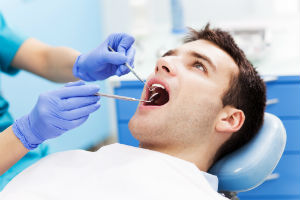
There's nothing to fear with a dental exam. Your teeth will be visually examined for signs of plaque, tartar and tooth decay. Your gums will also be examined for puffiness or discoloration, which are signs of gum disease. A full set of dental X-rays may also be taken during your dental exam, to enable your dentist to see below the surfaces of your teeth. Dental exams typically end with a dental cleaning, to remove surface stains and buildup.
Digital Dental X-Rays
Dental X-rays have come a long way. Todays dental X-rays are safer, faster, more comfortable and more informative than the X-rays of years past. Digital X-rays, one of the latest and most advanced dental technologies, produce high-quality images of your teeth that can be viewed instantly by you and your dentist on a LCD monitor. Digital X-rays reduce radiation by up to 90% and provide exceptional diagnostic information to ensure that potential problems are caught in their earliest stages. Intraoral photography is another alternative to traditional dental X-rays. With intraoral photography, problems such as cavities, fractures and discolorations in the teeth are captured through clear and sharp photographic images that are taken with a 35mm or digital camera.
Teeth Cleaning
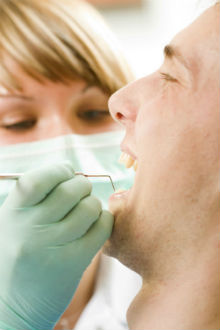
A laser teeth cleaning, also known as an ultrasonic cleaning, is a popular alternative to traditional teeth cleanings. With a laser teeth cleaning, an ultrasonic scaler (rather than a manual probe) is used to remove deposits, kill harmful microbes and eliminate bacteria around the teeth and gums through high-frequency sound waves. Many patients find laser teeth cleanings more comfortable than traditional teeth cleanings because they are quicker, quieter and pain-free.
A deep cleaning may be recommended if excessive plaque and tartar deposits have developed below the gum line. Deep cleanings, also known as scaling and root planing, involve a two-part process: first, the stubborn deposits are removed, and then the root surfaces are smoothened. A deep cleaning helps prevent periodontal disease and restores gum tissues to a healthy state.
Oral Cancer Screening
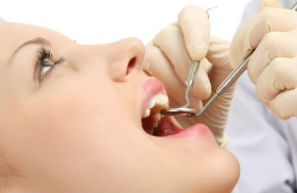
Dental Fillings
If you've been told you need a dental filling, you're not alone: 92% of Americans have had at least one cavity. Dental fillings are the tried-and-true treatment for treating cavities – and they come in a variety of options to suit every need. Dental fillings can be made of silver amalgam, composite, porcelain and even gold. Amalgam fillings have been used by dentists for more than a century and are still the most common and cost-effective type of dental filling. But composite fillings, which are made of a tooth-colored plastic and glass composite, are quickly becoming the preferred dental filling due to their natural appearance and durability. The type of dental filling used is determined by a number of factors, including size and location of the cavity, as well as your budget.
White Fillings
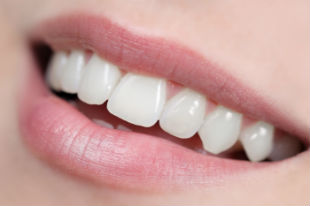
Dental Bridges & Crowns
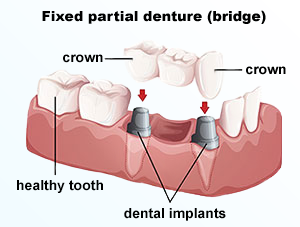
There are three types of dental bridges: 1) traditional dental bridges, 2) cantilever dental bridges, and 3) Maryland bridges. Traditional bridges have either dental crowns or dental implants on either side of the missing tooth, plus a replacement tooth, which is held in place by a post-like structure called a dental abutment. Cantilever dental bridges are used in cases where there are surrounding teeth only on one side of the missing tooth. Maryland bridges are made of a specialized resin that is cemented to a metal framework and cemented to the enamel of surrounding teeth.
Dental bridges typically take 2-3 weeks to complete and are less invasive than other options, such as dental implants. With good oral hygiene and regular dental visits, dental bridges can last up to 30 years.
Although dental crowns can be made of a variety of materials, including stainless steel, gold and silver, nothing looks better than a porcelain dental crown. Porcelain dental crowns match the natural color of your teeth and are virtually undetectable by the naked eye. And because they're metal-free, porcelain dental crowns are an excellent option for patients with metal allergies. Best of all, porcelain crowns don't just look beautiful – they're long-lasting, too!
Dentures

The process of getting dentures may take a few months and several dental visits. In some cases, however, same-day dentures are also possible. With same-day dentures, the dentures are created right in the dentist's office instead of at an offsite laboratory. Same-day dentures aren't for everyone, though. If your dentures require a lot of customization, same-day dentures may not be right for you.
Just as with your natural teeth, dentures require daily maintenance. With regular wear and tear, your dentures can last 5-7 years. During that time, you may need periodic denture relines to accommodate changes in the contours of your mouth. Regular denture relines involve resurfacing the base to ensure that your dentures fit and function perfectly. If you break your dentures, it's critical to bring them to your dentist for professional denture repair. Home denture repair kits can cause more damage and be even more costly to fix.
Gum Disease Treatment
Periodontics refers to the treatment and maintenance of the structure that supports your teeth - namely, the gums and bone matter.
Gingivitis is an early form of periodontitis, or gum disease. If you experience an occasional swelling of the gums, gums that bleed after brushing or flossing, itchy gums, or bright red or purple gums, chances are you have gingivitis. Gingivitis can be treated by having your teeth professionally cleaned, followed by a strict oral hygiene regimen, including anti-bacterial rinses.
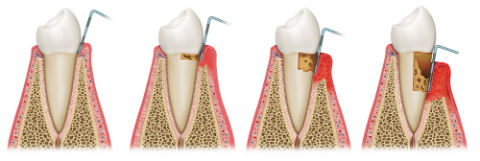
Left untreated, gingivitis can escalate into periodontitis - although there are other factors that can contribute to the disease, including smoking, genetic tendencies, and unchecked diabetes. Periodontitis symptoms include those of gingivitis, as well as a metallic taste in the mouth, receding gums, enlarged spaces between the gums and teeth, severe halitosis (bad breath), and even loose teeth (from loss of bone).
Dental Bone Graft
When attempting to place a dental implant in your mouth we may sometimes discover that bone loss has occurred on the site of a potential implant. Bone loss in the mouth can occur as a result of several factors including, periodontal disease or infection.
Fortunately, Columbia Prime Dental has a solution. Our dentists can fill in the gaps and replace the missing bone in a process known as bone grafting. With bone grafting your dentist can widen or heighten the site of your implant and fill in all types of defects caused by tooth loss or extraction.
Whenever possible we'll extract bone directly from the patient. However, we can also utilize "bottled bone" from other sources when necessary.
As with any other dental procedure Columbia Prime Dental performs, you can expect that your grafting will be undertaken with the highest degree of care and professionalism and that you'll be consulted on every facet of the operation. Once bone has been restored to the appropriate areas you will be fully prepared to receive any necessary implants and improve your dental health.
Endodontics
Generally caused by tooth decay or shock, pulp or nerve tissue damage can be an excruciating experience, with symptoms including pain while chewing, sensitivity and swelling. If left untreated, pulp damage can lead to abscesses, or pus-filled infections, and eventually to tooth loss.
Endodontics, or root canal therapy, is the branch of dentistry that deals with treating dental pulp damage and is the best way to directly address the pain and save the tooth. During a root canal procedure, infected nerve tissue is cleaned out and replaced with filler to prevent further infection.
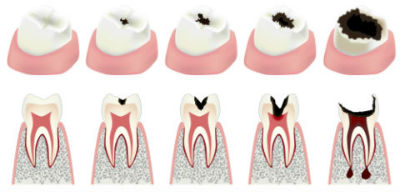
With proper anesthesia, root canal therapy can be a pain free process.
At Columbia Prime Dental, we have training in root canal therapy and take every measure to ensure our patients' maximum comfort throughout the procedure. If you are experiencing tooth pain, sensitivity or swelling, it is important to act fast, not only to relieve your pain, but also to save the tooth from complete decay.
Oral Surgery
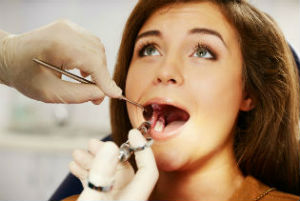
Nitrous Oxide

There are different levels of sedation to accommodate every patient. Minimal sedation involves inhaling nitrous oxide (“laughing gas”). Nitrous oxide helps you relax and wears off quickly. Electronic anesthesia is an alternative form of mild sedation that uses electronic impulses to help you relax. Conscious sedation is a moderate level of sedation that causes drowsiness and is taken in pill form. IV deep sedation is typically administered intravenously and works very quickly. With IV deep sedation, most patients fall asleep but can be easily awakened. Total sedation could be the only solution for people with an intense fear or phobia of dentistry. With total sedation, or general anesthesia, you are completely unconscious and cannot be easily awakened.
Sleep Apnea
Dentists are known for everything having to do with teeth. So, what can a dentist tell you about snoring?
If you've ever been kicked out of bed for snoring too much or too loudly, or if your snoring is disrupting your sleep patterns, you have something called sleep apnea.
Sleep apnea comes in two forms. The most common form is obstructive sleep apnea, which occurs when your windpipe is blocked while sleeping. The blockage can be from your uvula, tonsils, tongue, throat tissue, or even by the muscles in your throat.
A more rare form of sleep apnea is caused by a disruption of your central nervous system - the signals from your brain that control your breathing don't reach the appropriate places.
Regardless of which type of sleep apnea you have, what happens is that you stop breathing for 10 to 30 seconds, several times a night while you sleep. This causes you to wake up - which disrupts your sleep, and prevents you from getting the quality deep sleep your body needs to function at its best.
While you cannot die directly from sleep apnea, it can cause heart disease and strokes. Your doctor can diagnose sleep apnea, and refer you for treatment. There are dental devices available for treatment, which help you to breathe easier, that realign your jaw in a more forward position.
Pediatric Dentistry

